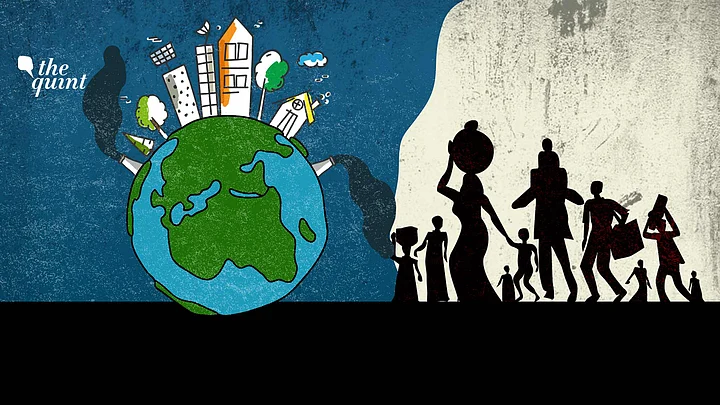The potential effect of climate change on the world's cultural and natural legacy is worrisome. In 1972, UNESCO member states adopted the Convention for the Protection of the World Cultural and Natural Legacy to ensure that our common heritage is maintained. Earlier, the international community had been ignorant of the underlying danger that climate change posed to world heritage sites and the culture that comes with those sites.
A United Nations convention in 2003 called for the safeguarding of intangible cultural heritage. The recognition that the world’s tangible and intangible cultural heritage are interdependent, and the awareness that we must take an interconnected approach to environmental protection and sustainable development, emerged around this time.
Preserving Both Tangible and Intangible Culture
Climate adaptation has several ramifications. Human beings move and relocate, they adjust to crises such as food shortages, and they find substitutes for previously unavailable goods and resources. While climate displacement has been recognised as a problem since the 1951 Refugee Convention, cultural heritage had not been studied in relation to its impact on climate change until the 21st century. Cultural heritage has received some attention in climate relocation studies, but little attention has been paid to the cultural heritage of displaced people. The IPCC (Intergovernmental Panel on Climate Change), which analyses key scientific and socio-economic data for interpreting climate change, recognises migration as one of the severe climate change impacts.
At its 29th session in 2005, the World Heritage Committee identified climate change as an increasing danger to the protection of many cultures. How migrating individuals are integrated into receiving communities will determine whether or not cultural elements survive.
Climate change policies that include cultural values may aid in the preservation of both tangible and intangible values for disadvantaged populations. As global tensions over immigration continue to rise, host communities should be aware that diversity can be a beneficial force by bringing new views and problem-solving techniques to communities and businesses.
Survival of Culture Depends on Host Countries
Intangible cultural heritage primarily refers to cultural expressions that are not material in nature, such as ideas, information, practices, rites, skill and taste. They embody the diversity of humanity’s living legacy and serve as the primary vehicle for cultural diversity. Consider the shrinking landmasses caused by climate change and the fast rise of sea levels in the financial hub of Mumbai. According to NITI Aayog, Mumbai will be submerged by 2050. Mumbai becomes a good example of how affordability to fly and migrate to another country in search of a similar, if not better, standard of living comes at the expense of traditions and culture. And the survival of culture depends on host countries accepting migrants without showing any hostility.
Not everyone is wealthy enough to make life-altering choices, such as moving to other locations. It is critical to comprehend how residents of Mumbai's slums become victims of global warming and are forced to relocate.
We refer to them as environmental migrants or climate refugees. It is not difficult to fathom how their traditions and cultures also dwindle away when they move, nor how difficult their mere survival becomes if there is no generous acceptance from their new hosts. Migration may result in the disintegration of communities and the abandoning of land, eventually resulting in the loss of rituals and cultural memory.
The Example of Yamuna
In terms of cultural conservation, this desertion is concerning, particularly in settings where traditional knowledge and skills are required to guarantee the appropriate preservation of these practices. If the migrants feel unwelcomed or not encouraged to practise their traditions, generations to come might become oblivious to their culture.
Festivals in India have a strong connection to nature. Chhath Puja is one of them. The River Yamuna passes through our national capital and it is believed to be a sacred river with high cultural context.
Every year, in the month of November, people from Delhi perform Chhath Puja in the Yamuna. Unfortunately, the Yamuna is slowly dying due to excessive pollutants introduced by riparian industries and communities.
With the deteriorating conditions of the Yamuna, people who believe and wish to maintain this festival will be deprived. There have been attempts by the present Delhi government to rescue the Yamuna, but with little result.
From singular monuments to numerous assets and sites, historic cities, and cultural landscapes, the notion of cultural heritage has evolved through time. In recent years, the World Heritage Convention has been effective in recognising cultural heritage and in guiding conservation activities across the world.
Some academics and researchers are attempting to broaden the concept of cultural heritage by focusing on topics such as ethnicity, culture, and religious beliefs. Earlier, the notion of culture was completely reliant on lived experiences within a culturally homogenous community. Today, we seem to have evolved into a more diverse and inclusive understanding of culture and the need to preserve its benefits for ourselves and for future generations.
(Dr. Armin Rosencranz is a Professor & Dean at Jindal School of Environment and Sustainability. Mr. Tharun Vuyyuru is a student at the same institute. This is an opinion piece and the views expressed above are the author’s own. The Quint neither endorses nor is responsible for the same.)
